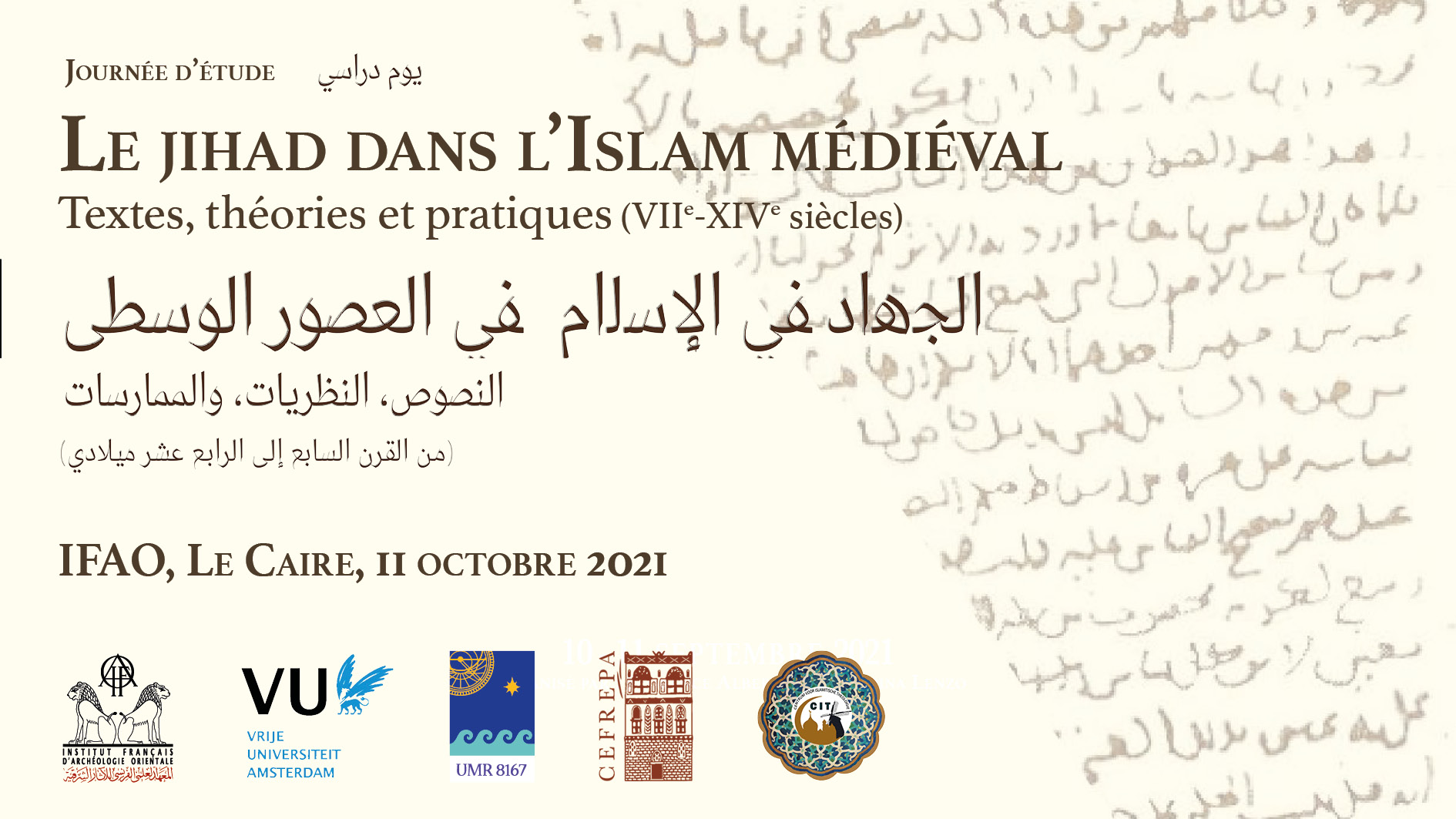Manifestations scientifiques
Abonnez-vous à la … Subscribe to the Mailing list :

Journées d’études
Le lundi 11 octobre 2021 à 9h00 (heure du Caire), IFAO 
Jihad in Medieval Islam. Texts, theories, and practices (7th-14th c.)
الجهاد في الإسلام في العصور الوسطى. النصوص، النظريات، والممارسات (مـن القـرن السـابع إلـى الرابـع عشـر ميـلادي)
Mehdi Berriah (Vrije Universiteit Amsterdam) & Abbès Zouache (CNRS/Ifao)
Partenaire(s) de l’Ifao : UMR 8167 Orient and Mediterranean, Vrije U niversiteit Amsterdam and the Centre for Islamic Theology (VU Amsterdam), French Research Centre of the Arabian Peninsula ( CEFREPA)
Langue : anglais.
The subject of jihad figures prominently in current debates on Islam. In the academic field, it has been ceaselessly generating a great number of publications ever since the attacks of 2001. The majority of this production are works by political scientists and, to a lesser extent, by sociologists who are primarily interested in the variants and effects of jihad ideology in contemporary societies. In order to interpret these political and societal variants and effects, the phenomenon of jihad has to be approached in the long-term and in all its complexity. Intellectuals, as well as the different groups and individuals who align themselves with jihad and/or propose definitions of it, refer to thinkers and texts written in the Middle Ages, hence the importance of studying medieval jihad.
However, medieval jihad is unequally documented by occidental scholarship, which quasi-systematically neglects the approach of Arab intellectuals to the subject. The global approach sought by certain researchers like Michael Bonner, which does not limit itself to the crusade as a sole prism, hardly bore any results: this prism continues to largely haunt them. Furthermore, it is often considered as a monolithic ideology establishing a law of war that imposes standards of behavior on all social actors.
This workshop seeks to distinguish itself from these approaches and aims to fill the gaps they induced. Decidedly multi-disciplinary, it aspires to grasp the jihad phenomenon with its various dimensions: ideological,jurisprudential, political, economic, and social. Participants will have complete freedom to gather all of the corpora, edited or in manuscript form, which refer to jihad: legal and narrative texts, kutub al-fada'il, furusiyya manuals, etc. Participants are invited to study jihad within its context and its evolutions, and to try to discern the complex relation between the theories of jihad-as a set of principles and prescriptions-and the multiple practices that fall under their scope, that which implies systematically questioning whether they merely prompted them or if on the contrary, they generated them.
This workshop is part of a research project titled Le corpus taymiyyen sur le jihad: reception, decontextualisation et utilisation par les mouvances iihadistes (French Ministry of Interior - Central Bureau of Cults ; direction: Mehdi Berriah), and organised in partnership with the French Research Centre of the Arabian Peninsula (CEFREPA), the research programme based at IF AO "W ar in the Medieval Orient: Transmission of knowledge, social practices and sensible approach" direction: M. E ychenne, A. El-Shoky, A. Zouache, UMR 8167 Orient and Mediterranean, V rije U niversiteit Amsterdam and the Centre for Islamic Theology (VU Amsterdam).
It will take place in the French Institute for Oriental Archaeology (IFAO) in Cairo, on Monday 11 th October 2021 and will result in the publication of a collective volume. English and Arabie will the languages of communication, and the duration of each paper submission will be 20 minutes. There will also be a part dedicated for Q&A' s at the end of each session. The cost of transport and accommodation (three nights maximum) of participants could be covered.
In case the health situation does not permit the workshop taking place in-person, it will be in the form of an online webinar on Zoom.
Contact : m.berriah@vu.nl
Argumentary in English ; Argumentaire de la journée d'études en français ملف اليوم الدراسي باللغة العربية
Programme : Download the programme
9:00-9:15 — Opening : Laurent Coulon (Director/Ifao) and/or Abbès Zouache (Director of studies/Ifao), Words of welcome
9:15 — Introduction : Mehdi Berriah (Vrije Universiteit Amsterdam) & Abbès Zouache (Ifao, Cairo)
Jihad’s issues in Medieval Islamic law
9:30 – 11:00 Chairman : Taef Elazhari (Helwan University, Cairo)
— Moussa Abou Ramadan (Strasbourg university), The Distinction between Combatant and Civilian in Sarakhsī’s Legal Doctrine
— Mehdi Berriah (Vrije Universiteit Amsterdam), The Empty Bayt al-Māl: a Sine Qua Non Condition for the Imposition of a Tax for Financing Jihad?
— Yaser Ellethy (Vrije Universiteit Amsterdam), A Medieval Derelict Jihad Canon: Ibn Taymiya’s Qā‘ida Mukhtaṣara fī Qitāl al-Kuffār and the Ethics of Combating Non-Believers
11:00-11:30 Coffee break
Jihad, Crusades and Furūsiyya
11:30-12:30 Chairman: Yaser Ellethy (Vrije Universiteit Amsterdam)
— Taef Elazhari (Helwan University, Cairo), The Politics of Jihad in Early Crusading Period Among the Turkmen and Kurds
— Abbès Zouache (Ifao, Cairo), Jihad vs Furūsiyya. Preliminary Reflections
12:30-14:00: Lunch
Jihad in Western Islam
14:00-15:00 Chairman: Mehdi Berriah (Vrije Universiteit Amsterdam)
— Mehdi Ghouirgate (Bordeaux III University), The Holy War: The Key Stone of the Berber Empires
— Yassir Benhima (Paris 3 Sorbonne Nouvelle University), ممارسة الجهاد في العصر المرابطي من خلال نوازل ابن الحاج التجيبي
15:00-15:30 Coffee Break
15:30-16:30 Keynote lecture : Suleiman Mourad (Smith College)
Reexamination of the Concept of Jihad in Medieval Islam: Historical Realities vs Modern Polemics
16:30-17:00 Conclusion
Mehdi Berriah (Vrije Universiteit Amsterdam) & Abbès Zouache (Ifao, Cairo)
Publishing process information and timeline

